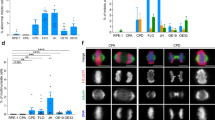Abstract
Background: Disruption of normal mechanisms for cell cycle regulation is important in carcinogenesis. SAK and PLK are members of the polo family of serine threonine kinases, which in lower organisms have been shown to be required for the precise regulation of mitosis. Studies of human polo family members have focused on PLK, which has been found to be overexpressed in several tumor types, with the degree of overexpression correlating with adverse clinical outcome. However, PLK expression had not previously been analyzed in colorectal cancer. SAK, a polo family member with unique properties, had not been systematically studied in any tumor type.
Methods: In this study, SAK expression was evaluated in a series of sporadic human colorectal cancer specimens (n = 74) and compared with that of PLK. Expression was assessed by reverse transcription-polymerase chain reaction.
Results: In the majority of cases, both SAK and PLK were more highly expressed in tumor tissue than in adjacent normal intestinal mucosa. Levels of SAK and PLK expression in tumor relative to paired normal mucosa correlated directly with patient age and with each other but did not correlate with tumor stage. These results suggest a mechanism for augmented disruption of mitotic regulation in older patients.
Conclusions: The polo family mitotic regulators SAK and PLK are both aberrantly expressed in colorectal cancer. The potential prognostic significance of SAK and PLK expression in colorectal cancer will be evaluated in the future.
Similar content being viewed by others
References
Glover DM, Ohkura H, Tavares A. Polo kinase: the choreographer of the mitotic stage? J Cell Biol 1996; 135: 1681–4.
Hudson JW,ChenL-Y, Fode C, Binkert C, Dennis J. Sak kinase gene structure and transcriptional regulation. Gene 2000; 241: 65–73.
Lane HA, Nigg EA. Antibody microinjection reveals an essential role for human polo-like kinase 1 (Plk1) in the functional maturation of mitotic centrosomes. J Cell Biol 1996; 135: 1701–13.
Fode C, Motro B, Yousefi S, Heffernan M, Dennis J. Sak, a murine protein-serine/threonine kinase that is related to the Drosophila polo kinase and involved in cell proliferation. Proc Natl Acad Sci U S A 1994; 91: 6388–92.
Hudson JW, Kozarova A, Cheung P, et al. Late mitotic failure in mice lacking Sak, a polo-like kinase. Curr Biol 2001; 11: 441–6.
Mundt KE, Golsteyn R, Lane HA, Nigg EA. On the regulation and function of human polo-like kinase 1 (PLK1): effects of overexpression on cell cycle progression. Biochem Biophys Res Commun 1997; 239: 377–85.
Smith MR, Wilson ML, Hamanaka R, et al. Malignant transformation of mammalian cells initiated by constitutive expression of the polo-like kinase. Biochem Biophys Res Commun 1997; 234: 397–405.
Fode C, Binkert C, Dennis J. Constitutive expression of murine Sak-a suppresses cell growth and induces multinucleation. Mol Cell Biol 1996; 16: 4665–72.
Wolf G, Elez R, Doermer A, et al. Prognostic significance of polo-like kinase (PLK) expression in non-small cell lung cancer. Oncogene 1997; 14: 543–9.
Knecht R, Elez R, Oechler M, Solbach C,von von Ilberg C, Strebhardt K. Prognostic significance of polo-like kinase (PLK) expression in squamous cell carcinomas of the head and neck. Cancer Res 1999; 59: 2794–7.
Tokumitsu Y, Mori M, Tanaka S, Akazawa K, Nakano S, Niho Y. Prognostic significance of polo-like kinase expression in esophageal carcinoma. Int J Oncol 1999; 15: 687–92.
Ozcelik H, ToMD, Couture J, Bull SB, Andrulis IL. Preferential allelic expression can lead to reduced expression of BRCA1 in sporadic breast cancers. Int J Cancer 1998; 77: 1–6.
Yuan J, Stutte HJ, Hock B, Stutte HJ, Rübsamen-Waigmann H, Strebhardt K. Polo-like kinase, a novel marker for cellular proliferation. Am J Pathol 1997; 150: 1165–72.
LyDH, Lockhart DJ, Lerner RA, Schultz PG. Mitotic misregulation and human aging. Science 2000; 287: 2486–92.
Ponz de Leon M, Sacchetti C, Sassatelli R, Zanghieri G, Roncucci L, Scalmati A. Evidence for the existence of different types of large bowel tumor: suggestions from the clinical data of a population-based registry. J Surg Oncol 1990; 44: 35–43.
Weisburger JH, Wynder EL. Etiology of colorectal cancer with particular emphasis on mechanisms of action and prevention. In: De Vita VT, Hellman S, Rosenberg SA, eds. Important Advances in Oncology. New York: Lippincott, 1987.
Kern SE, Fearon ER, Tersmette KWF, et al. Clinical and pathological association with allelic loss in colorectal carcinoma. JAMA 1989; 261: 3099–103.
Kouri M, Pyrhonen S, Mecklin JP, et al. The prognostic value of DNA-ploidy in colorectal carcinoma: a prospective study. Br J Cancer 1990; 62: 976–81.
Armitage NC, Robins RA, Evans DF, Turner DR, Baldwin RW, Hardcastle JD. The influence of tumor cell DNA abnormalities on survival in colorectal cancer. Br J Surg 1985; 72: 828–30.
Roncucci L, Fante R, Losi L, et al. Survival for colon and rectal cancer in a population-based cancer registry. Eur J Cancer 1996; 32A: 295–302.
Carlon CA, Fabris G, Arslan-Pagnini C, Pluchinotta AM, Chinelli E, Carniato S. Prognostic correlations of operable carcinoma of the rectum. Dis Colon Rectum 1985; 28: 47–50.
Jass JR, Atkin WS, Cuzick J, et al. The grading of rectal cancer: historical perspectives and a multivariate analysis of 447 cases. Histopathology 1986; 10: 437–59.
Galitski T, Saldanha AJ, Styles CA, Lander ES, Fink GR. Ploidy regulation of gene expression. Science 1999; 285: 251–4.
Rooney P, Murray GI, Stevenson DAJ, Haites NE, Cassidy J, McLeod HL. Comparative genomic hybridization and chromosomal instability in solid tumors. Br J Cancer 1999; 80: 862–73.
Author information
Authors and Affiliations
Additional information
Presented at the 54th Annual Meeting of the Society of Surgical Oncology, Washington, DC, from March 15–18 2001.
Rights and permissions
About this article
Cite this article
Macmillan, J.C., Hudson, J.W., Bull, S. et al. Comparative Expression of the Mitotic Regulators SAK and PLK in Colorectal Cancer. Ann Surg Oncol 8, 729–740 (2001). https://doi.org/10.1007/s10434-001-0729-6
Accepted:
Published:
Issue Date:
DOI: https://doi.org/10.1007/s10434-001-0729-6




